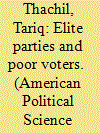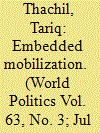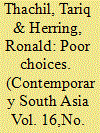| Srl | Item |
| 1 |
ID:
133034


|
|
|
|
|
| Publication |
2014.
|
| Summary/Abstract |
Why do poor people often vote against their material interests? This article extends the study of this global paradox to the non-Western world by considering how it manifests within India, the world's biggest democracy. Arguments derived from studies of advanced democracies (such as values voting) or of poor polities (such as patronage and ethnic appeals) fail to explain this important phenomenon. Instead, I outline a novel strategy predicated on an electoral division of labor enabling elite parties to recruit the poor while retaining the rich. Recruitment is outsourced to nonparty affiliates that provide basic services to appeal to poor communities. Such outsourcing permits the party to maintain programmatic linkages to its elite core. Empirically, I test this argument with qualitative and quantitative evidence, including a survey of more than 9,000 voters. Theoretically, I argue that this approach is best suited to elite parties with thick organizations, typically those linked to religious social movements
|
|
|
|
|
|
|
|
|
|
|
|
|
|
|
|
| 2 |
ID:
106332


|
|
|
| 3 |
ID:
084245


|
|
|
|
|
| Publication |
2008.
|
| Summary/Abstract |
The surprising loss of the Bharatiya Janata Party (BJP)-led national government in India's 2004 general elections has been generally understood as a rejection of the National Democratic Alliance's campaign that celebrated a 'Shining India' among voters who had not shared in the wealth produced by India's recent growth boom-especially Scheduled Caste and Scheduled Tribe electorates. A close look at the empirical evidence demonstrates that Dalit and Adivasi communities were by no means the homogeneous voting block portrayed in many post-election analyses. Nor did the BJP consistently lose in these constituencies. Both findings undermine the currently popular conceptualization of Indian electoral and party behavior as identity-based or ethnic. Instead, the 2004 results confirmed a growing trend for these disadvantaged populations to vote for radically dissimilar parties across different states-from the Communist Party of India (Marxist), to the Congress, to the Bahujan Samaj Party, or indeed to the BJP itself-driven by plausible calculation of interests. Using national election data from the 1999 and 2004 elections, this paper examines the theoretical puzzle this divergent electoral behavior presents to both the comparative literature on cleavage-based party systems and the scholarship on caste and identity politics in India. We argue that at least some of this variance can be explained by the fact that differences in state-level conditions influence which of the array of strategies used by Indian parties to recruit Dalit and Adivasi voters is likely to be successful. We then analyze the specific puzzle of differential BJP success among Adivasi/Dalit communities. We conclude that the embedded nature of the BJP as a party with social movement characteristics, combined with the poor developmental performance of many Indian states for their most disadvantaged populations, opens a spatially and politically differentiated niche for a social-provisioning electoral strategy. Developing this strategy has aided the BJP in overcoming at least partially its legacy as a Brahmin-Bania party.
|
|
|
|
|
|
|
|
|
|
|
|
|
|
|
|